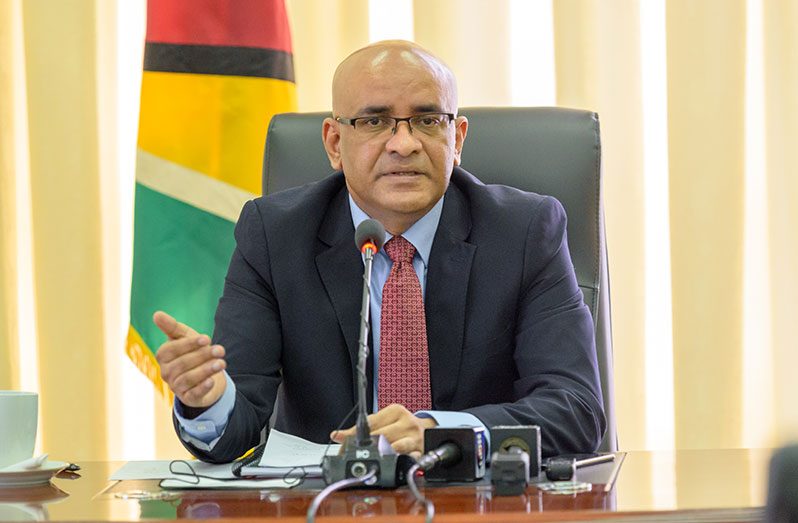AS Guyana moves ahead with the development of its petroleum industry, Vice-President Bharrat Jagdeo has said that oil blocks, which remain untouched in some cases, would be up for auction by the third quarter of 2022.
As it is now, ExxonMobil is the operator of the Stabroek, Canje and Kaieteur blocks offshore Guyana. Since 2015, the company has increased its estimated recoverable resource base in Guyana to more than nine billion oil-equivalent barrels.
Further, CGX, together with Frontera Energy Corporation, operates the Corentyne and Demerara blocks, and also has a share in the Berbice block.
And although the sector is already abuzz with activities, more opportunities are on the horizon, with plans to auction new blocks next year.
Speaking during a press conference at the Arthur Chung Conference Centre on Monday, Vice-President Jagdeo said the government intends to move first towards the enforcement of relinquishment provisions in all oil contracts before auctioning new blocks.
Simply put, relinquishment provisions are enforced when a party might no longer be able to deliver on a contract.
By adopting an approach which involves the enforcement of relinquishment provisions, authorities would be able to have not just virgin blocks but also relinquished areas for the impending auction.
President Dr. Irfaan Ali had said, in April, that when the government is ready to award new oil blocks, the process will be done transparently to ensure that Guyana gets the best deal.
“We have made it very clear that the process in awarding new oil blocks will be very much different. It will be an open, public process and when we get to that stage it will be a public, open bidding process. We will be looking for the best offer in an open public bid,” President Ali said.
In moving forward, President Ali said that the government has preliminarily discussed whether Guyana will retain some of the remaining oil blocks.
“…Discussions are still ongoing… it calls for a lot of technical analysis on whether Guyana itself will retain some of those blocks for our own development and to manage by ourselves, but that is very preliminary,” he related.

The outcome of those discussions would form part of the overarching expansion of the oil and gas sector, which, according to Vice-President Jagdeo, remains important even as the country moves towards investments in ‘green’ initiatives.
ACTIVE PLAYER
This is the case because the demand for fossil fuel, while projected to decline over the next few years, will remain fairly high and Guyana should be allowed to utilise the opportunity to be an active player in the market.
The direct benefits of the sector to the country are already visible, with Guyana earning US$436 million from the sale of 7,056,262 barrels of oil.
Guyana sold its first one million barrels of crude on February 19, 2020, raking in nearly US$55 million. In its second million-barrel sale, the country received US$35 million, and another US$46 million as proceeds from the sale of its third million-barrel of crude, and US$49.3 million from its fourth oil lift.
In early March, Guyana also received US$61,090,968 (approximately G$13 billion) from the sale of the nation’s fifth oil lift. Further, it earned in excess of US$60 million from the sale of its sixth oil lift, and received US$13.9 million in royalties during the first quarter of this year.
It was reported in May that the country’s total revenue is expected to increase by 17 per cent, with earnings in the petroleum sector alone reaching well over US$500 million by the end of this year. With oil prices on a continuous rise, that figure could further skyrocket.
President Ali had said that the oil revenues must be used to strengthen existing opportunities in Guyana and to open new opportunities for investment, economic growth and social development, among other areas.
“In creating those opportunities, we have to ensure that there is equity and there is no widening between those who have and those who don’t have… the resources have to be used to close that gap. So, healthcare, education, food security, housing — these are all areas that are critical to closing that gap,” President Ali posited.
He further related that new opportunities will be opened for ownership of land, farming and other agriculture, and for Guyana to realise its potential of becoming the prime supplier of food regionally.




.png)









